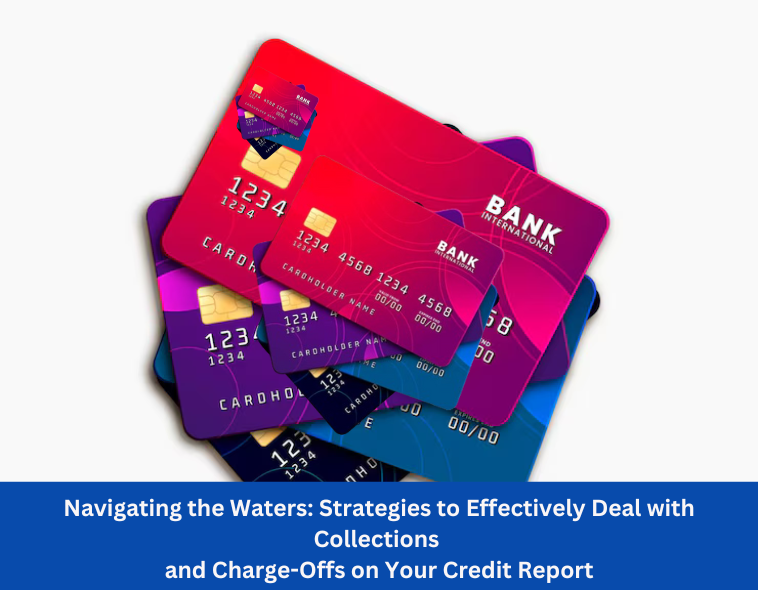A clean credit record is essential for sound financial management since it affects your capacity to get loans, get good interest rates, and even get hired. Regretfully, many people struggle with collections and charge-offs, and it’s not always easy to get a spotless credit history. This essay explores the complexities of managing these monetary losses, providing insightful analysis and useful tactics to assist you in taking back control of your credit.
Comprehending Charge-Offs and Collections
Understanding collections and charge-offs is crucial before moving on to solutions. Collections happen when your account is transferred to a third-party debt collector by your creditor, typically following several months of nonpayment. In contrast, charge-offs occur when a creditor writes off a debt as unlikely to be collected, usually following several months without payment. Your financial situation and credit score are greatly impacted by both incidents.
Evaluating the Injury
Evaluating the damage is the first stage in handling charge-offs and collections. Get a copy of your credit report from Equifax, Experian, and TransUnion, the three main credit bureaus. Examine each entry with care, noting any accounts that have been charged off or sent to collections. Make a note of the sums due, the delinquent dates, and the names of the relevant creditors and collection agencies.
Having Talks with Debtors
Consider contacting your creditors after you have a clear understanding of your circumstances. The original creditor may still have some sway even after the debt has been turned over to a collections agency. Start a conversation to explore the potential of creating a payment plan or settling the debt for a lesser sum. If creditors think that negotiating will boost their chances of recovering part of the outstanding balance, they might be open to negotiating.
Understanding Debt Validation
Verifying debt stands as a critical element in handling collections. When a collection agency contacts you, exercise your right to demand documentation verifying the debt’s legitimacy. The agency is obligated to furnish proof of ownership and the ability to collect. If they fail to provide credible evidence, you might have grounds to dispute the debt, potentially leading to its removal from your credit history.
Approaching Collection Agencies to Bargain
If you are unable to reach an agreement with the original creditor, it is time to speak with the collections agency directly. Learn about your rights under the Fair Debt Collection Practices Act (FDCPA) before you do this. This law protects customers from unfair tactics by outlining standards that collecting agencies must follow. Equipped with this understanding, work up a settlement or a payment schedule that works for your budget.
Requesting Agreements for Pay-for-Delete
In pay-for-delete agreements, you agree to pay a portion of your debt to erase the related credit entry. Even if not all collection agencies will accept these kinds of agreements, it’s still worthwhile to bring up the subject when negotiating. Remember that pay-for-delete arrangements are not always enforceable and that you should always get a written agreement before sending money.
Credit Restoration
Rebuilding your credit is an equally important component of the equation as handling collections and charge-offs.Ensure you make all upcoming payments on schedule first. Throughout time, timely payments raise your credit score. You should also think about getting a secured credit card, which can help you rebuild your credit and just needs a cash deposit. Use credit cards judiciously, maintaining small amounts and making the monthly payment in full.
Contesting False Information
Errors in credit reports have the potential to worsen your financial situation. Challenge any mistakes you find right away. Inaccurate sums, dates, or even accounts that are not yours can fall under this category.
Credit reporting organizations must investigate complaints and rectify any errors within a fair time.
Getting Expert Help
Seek expert help if handling charge-offs and collections becomes too much for you to handle on your own. Credit counseling organizations can offer advice on managing debt, creating a budget, and settling disputes with creditors. A trustworthy credit repair business may also be able to assist you in navigating the complexities of credit reporting and resolving errors on your behalf.
Sustaining Budgetary Restraint
Maintaining discipline in your financial practices is ultimately the key to long-term financial health. Establish a sensible spending plan, give paying off debt top priority, and regularly check your credit score for any alterations. You can progressively repair your credit and move toward a prosperous financial future by embracing prudent financial practices.
Conclusion
It takes initiative and planning to deal with charge-offs and collections on your credit record. You can take action to take back control of your credit by learning about the nuances of these financial setbacks, settling disputes with creditors and collection agencies, and forming appropriate spending habits. Recall that while the path to credit recovery may be difficult, you can create the conditions for a better financial future by being determined and making wise decisions.
FAQs
1. Does handling collections require the help of a professional?
While it’s not required, expert guidance or the services of a credit repair organization can be helpful in negotiating the complexity of charge-offs and collections.
2. What is the duration of the collections entries on my credit report?
Negative impacts on your credit result from collections entries listed on your credit report for seven years.
3. Is it possible to pay off a debt for less than the whole amount due?
Yes, Some creditors and collection agencies may accept a lower settlement sum.
4. What happens if charge-offs and collections are ignored?
Ignoring charge-offs and collections might result in additional harm to your credit score as well as possible legal action.
5. If I practice financial restraint, is it possible to have collections entries removed?
Regular financial management, which includes making on-time payments, can help your credit over time.
#Deal #Collections #ChargeOffs #Credit #Report



